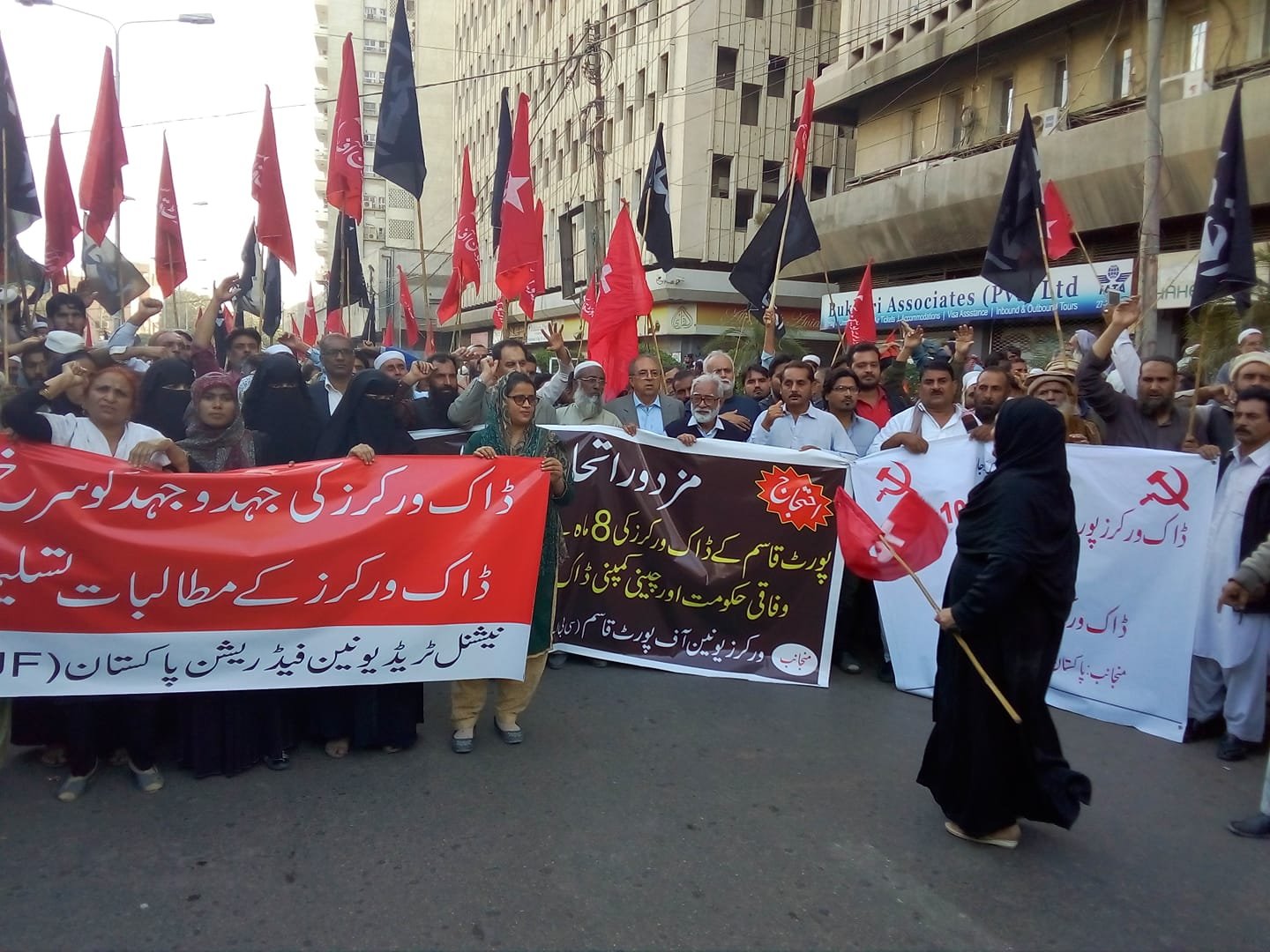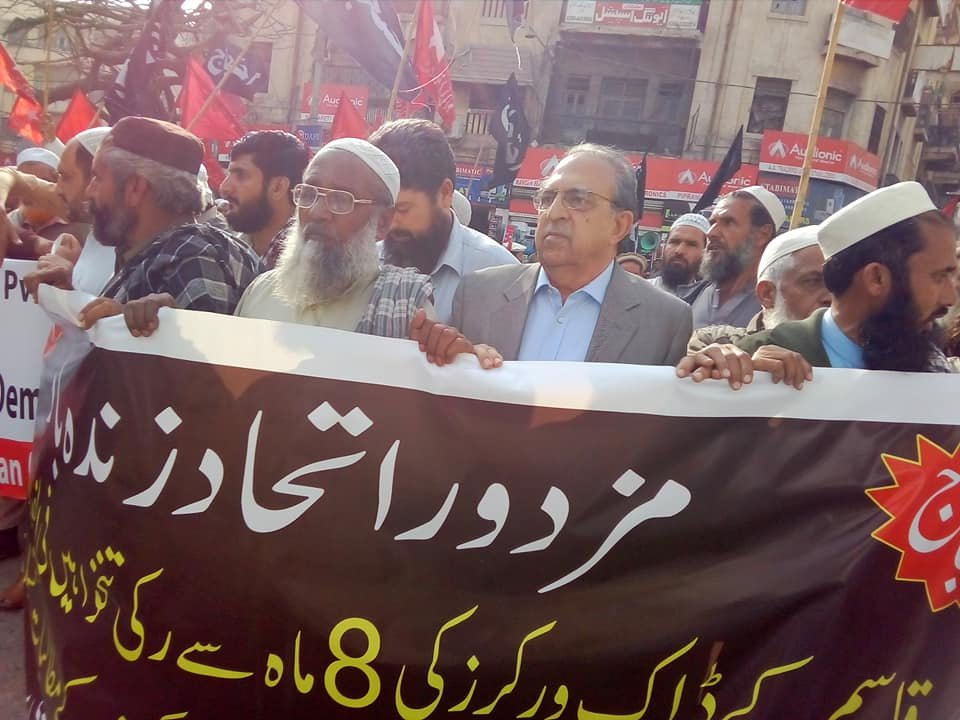Over 1,000, workers hold protest rally in Karachi to press their demands; Workers union threatens to shift the protest camp to Islamabad after Jan 10 if their demands not met
High Asia Herald Report
KARACHI

Workers of Port Qasim dockyard took out a massive rally in Karachi on Thursday against non-payment of their salaries and other demands. The rally was organized after completion of over 100 days of a protest camp set up outside Karachi Press Club to press the authorities to accept their demands.
They have been protesting against the PQA and a Chinese cargo management company which is managing and running two berths of the second largest port.

Hundreds of workers, activists and leaders of action committee an umbrella of various trade unions, including National Trade Union Federation (NTUF) including Awami Workers Party federal general secretary Akhtar Hussain and other AWP local members and office-bearers joined the rally to express solidarity with the protesting workers who have been on sit-in outside KPC for the last 120 days to save the future of their children amid growing financial crisis due to non-payment of salaries.
AWP leader supported the demands of the dock workers and assured them for his party’s full support.
He also demanded the government to accept the genuine demands of the workers.
Other labour and trade union leaders who joined the protest rally included Habibuddin Junaidi, Nasir Masoor, Liaquat Ali Sahi, Abdul Salam, Khalid Khan, Gul Badshah, Habib Jan, Zehra Khan and others.
The workers announced shifting their protest camp to D-Chowk, the place famous for long sit-ins in front of Parliament House in Islamabad after January 10 if their demands were not met.
The decision was announced by Port Qasim Workers Union (CBA) Secretary GeneralHussain Badshah at a press conference at the protest camp established in front of Karachi Press Club.
“Our plight has fallen on deaf ears of the government and officials of ministry of ports and shipping even after 100 days of peaceful protest, he added.
“We will start hunger strike there and continue unto death, Badshah warned.
Our children are out of school due to non-payment of fees and our families are starving. The government should take notice of the situation and resolve our issues, including payment of our salaries unpaid for eight months by the Chinese company, implementation of Dock Workers (Employment) Act at the port like Karachi Port Trust (KPT).
“We are not paid our salaries for the last five months and are being sacked by the Chinese company handling two births at Port Qasim.
The Chinese company has been given independent rights for berths number three and four at Port Qasim for 30 years on Build-Operate Transfer (Bot) basis and is handling the coal supply at the port for the Sahiwal Energy Project being run under another Chinese company – Huaneng Shandong Ruyi Energy.
Port Qasim Workers Unin president Akhlaq Ahmed Khan vowed to continue the street school on every Sunday until their demands are met.
Khan said that few government representatives are trying to convince us to end the protest on their verbal assurances but we will not end without a written agreement.
Rafiq Khan, a protester, said he had not been paid for the past nine months.
Workers Union senior deputy general secretary Abdul Wahid said that the Chinese shipping company was not paying their wages. He said that the company claimed that the workers had already been paid their six-month salaries. He also said that several politicians had visited the protest camps and had assured the protesters that their issues would be resolved soon but there was no progress in sight.
A number of labourers had become disabled during work.
PQA is not paying heed to their demands.
Over 350 workers were working on the ‘son’ quota after the retirement or death of their fathers. But the Chinese company, Hauaneng Fuyun Port and Shipping, had not issued entrance cards to the workers and is reluctant to renew their contracts.
Prime Minister Imran Khan had also taken notice of the protest by dock workers and instructed the Minister for Maritime Affairs Ali Haider Zaidi to address the concerns of the workers and resolve the issues.
In November, the protesters tried to march towards the Governor House from the press club. To disperse the protesters, police baton charged and used water cannons, resulting in several injuries. Many protesters were also arrested.
Makshift school
The dock workers have started a weekly makeshift street school at their sit-in camp outside Karachi Press Club. The children are being taught on the street while their parents protest for their demands.
One of the protesting workers, 55-year-old Muhammad Rafiq, hasn’t been home since the start of the protest. His two sons present at the camp were trying to convince their father to go home and take some rest. “His blood pressure is high. He needs rest,” said his younger son, visibly perturbed. “Abba [father] hasn’t gotten his salary for the past nine months. It’s difficult to make ends meet and he’s sitting here at the protest,” he added. Rafiq was one of the first ship loaders at Port Qasim when it started its operations in 1981.
As many as 1,757 dock workers, most from tribal areas of Khyber-Pakhtunkhwa, are suffering because of weak workers’ legislation.
Background
Initially the dock workers used to get work on pick and choose basis. When a ship used to anchor at the port, the company used to pick few of the workers for loading and unloading goods. The rest of the workers used to suffer from unemployment.
Then there came a rolling mechanism, according to which every worker would get work on their turn and the port would pay them a fixed amount per month and over time. This also safeguarded their health and other allowances.
This Dock Workers Act was then adopted in India in 1934 and in Pakistan in 1948. The act was further amended in 1974 and the Karachi Port Trust (KPT) adopted it.
Under the Act the Karachi Dock Labour Board (KDLB) was constituted for the welfare of dock labour, whose chairperson is also the KPT chairperson. The board is only functional in KPT, while the PQA, which started operations in 1981, never adopted the Dock Workers’ Act or accepted the KDLB.
The minimum fixed wage of every worker is Rs18,000 and they also pay for their welfare.
At PQA
The PQA has sold berths to private companies, such as Qasim International Container Terminal (QICT), Fauji Akbar Portia (FAP) Marine Terminals and Pakistan International Bulk Terminal (PITB) with exclusive rights to handle the containers on BOT basis. These companies are abide by the Docker Workers’ Act 1974 at KPT but they are flouting the Act at Port Qasim.
The QICT hired a private contractor to load and offload goods, which hires cheap labour. The FAP also brought in its own workers a few years back, and the dock workers who had gathered to protest against the move were subjected to a brutal baton charge by law enforcement agencies.
The real problem arose when the Chinese cargo handling company, Hauaneng Fuyun Port and Shipping, was given berths number three and four at Port Qasim in 2016.
After reservations from the worker’s union and a protest at the National Highway and the Port Qasim road, a memorandum of understanding was signed between the Chinese company and the workers’ union on October 23, 2017 for the provision of work at the two berths.
According to the agreement, the Chinese company would work for 30 years Built-Operate and Transfer (BOT) model and the company agreed to hire labour force through the union to work on berths 3 and 4.
“If there will be a need for more workers at these berths or for a need to replace any worker, the required workers or replacements will be firstly taken from existing 1,751 dock workers working at Port Qasim,” the memorandum reads.
The labourer started working for the company in July 2017. However, the Chinese company started holding payments of workers and in July 2018, asked them to leave their jobs. Upon which the workers union approached a labour court and obtained a stay order.
The management wants to hire less paid workers because the labour unions are demand their allowances, which the management does not want to pay.

The High Asia Herald is a member of High Asia Media Group — a window to High Asia and Central Asia

